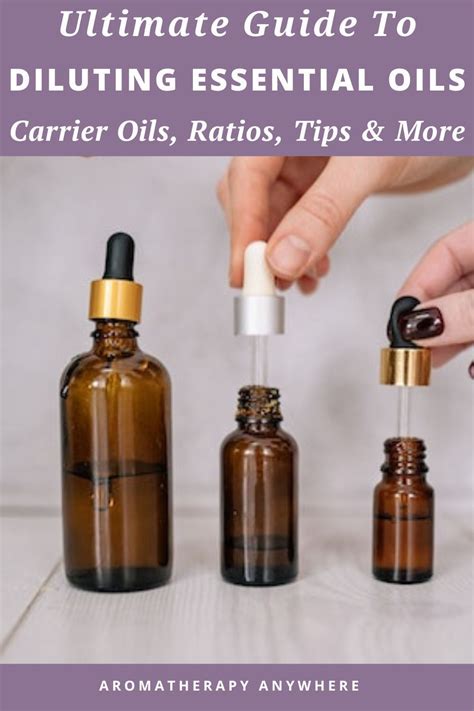Introduction
Essential oils are highly concentrated liquids extracted from plants. Due to their potency, they must be diluted before applying them to the skin. Carrier oils, such as jojoba, almond, and coconut, serve as safe and effective diluents for essential oils.

Understanding Carrier Oils
1. Types of Carrier Oils
Various carrier oils exist, each with unique properties:
- Jojoba Oil: Most similar to the skin’s natural oils, deeply hydrating and non-comedogenic.
- Almond Oil: Rich in vitamins A and E, nourishing and calming for sensitive skin.
- Coconut Oil: Solid at room temperature, antibacterial and antifungal, ideal for massage.
- Avocado Oil: Contains antioxidants and vitamins, deeply moisturizing and regenerative.
- Grapeseed Oil: Lightweight and non-greasy, suitable for acne-prone skin and hair.
2. Choosing the Right Carrier Oil
Consider the following factors when selecting a carrier oil:
- Skin Type: Dry skin requires richer oils (e.g., jojoba, avocado), while oily skin prefers lighter ones (e.g., almond, grapeseed).
- Essential Oil Properties: Some carrier oils enhance or alter the effects of essential oils (e.g., coconut oil increases absorption).
- Personal Preference: Choose an oil based on your desired texture, fragrance, and absorption rate.
Mixing Essential Oils and Carrier Oils
1. Dilution Ratios
The optimal dilution ratio varies depending on the essential oil’s potency and desired use:
- Low Concentrations (1-2%): For sensitive skin, aromatherapy, and daily use.
- Medium Concentrations (3-6%): For localized applications and massage.
- High Concentrations (7-10%): For specific therapeutic purposes or targeted applications.
2. Mixing Methods
- Roll-On Bottles: Pre-filled with the desired dilution ratio, convenient for localized applications.
- Diffuser: Add a few drops of diluted essential oil to the diffuser’s water reservoir.
- Massage Oil: Combine essential oils and carrier oil in a glass jar and massage into the skin.
Benefits of Essential Oil Carrier Oil Mixtures
1. Enhanced Absorption
Carrier oils facilitate the absorption of essential oils through the skin, maximizing their therapeutic benefits.
2. Reduced Skin Irritation
Pure essential oils can be irritating to the skin. Diluting them with a carrier oil reduces the risk of redness, itching, or rashes.
3. Versatility
Carrier oil mixtures allow for a wide range of applications, including:
- Topical Applications: For localized pain relief, inflammation reduction, or skin rejuvenation.
- Aromatherapy: For stress relief, emotional balance, or air purification.
- Massage: For relaxation, muscle recovery, or injury treatment.
Tables for Quick Reference
Table 1: Common Carrier Oils and Their Benefits
| Carrier Oil | Properties | Benefits |
|---|---|---|
| Jojoba | Non-comedogenic, deeply hydrating | Suitable for all skin types |
| Almond | Rich in vitamins A and E, calming | Nourishes and softens sensitive skin |
| Coconut | Solid at room temperature, antibacterial | Ideal for massage, antifungal |
| Avocado | Contains antioxidants, deeply moisturizing | Regenerates and rejuvenates skin |
| Grapeseed | Lightweight, non-greasy | Suitable for acne-prone skin and hair |
Table 2: Dilution Ratios for Topical Applications
| Skin Type | Dilution Ratio | Use |
|---|---|---|
| Sensitive | 1-2% | Daily use, aromatherapy |
| Normal | 3-5% | Massage, localized applications |
| Oily | 6-8% | Targeted applications, acne treatment |
| Dry | 9-10% | Deep moisturizing, wound healing |
Table 3: Applications of Essential Oil Carrier Oil Mixtures
| Application | Benefits | Examples |
|---|---|---|
| Aromatherapy | Stress relief, air purification | Diffuse lavender or chamomile oil |
| Topical Applications | Pain relief, inflammation reduction | Apply diluted peppermint oil to sore muscles |
| Massage | Relaxation, muscle recovery | Massage with diluted rosemary or eucalyptus oil |
| Skincare | Skin rejuvenation, acne treatment | Apply diluted frankincense or tea tree oil as a serum |
Table 4: Essential Oils for Common Ailments
| Ailment | Essential Oil(s) |
|---|---|
| Stress | Lavender, chamomile, bergamot |
| Pain | Peppermint, wintergreen, eucalyptus |
| Inflammation | Ginger, turmeric, clove |
| Acne | Tea tree, rosemary, lavender |
| Respiratory Issues | Eucalyptus, peppermint, thyme |
Tips and Tricks
- Patch test a small area of skin before using essential oil mixtures on a large surface.
- Store essential oil mixtures in amber glass bottles to protect them from light and oxidation.
- Dilute essential oils before applying them to pets or children.
- Consult a qualified healthcare professional before using essential oils if you have any underlying health conditions.
Conclusion
Essential oil carrier oil mixtures offer a safe and effective way to enjoy the benefits of essential oils. By understanding the properties of carrier oils and selecting the right dilution ratio, you can create customized mixtures for a variety of applications. From aromatherapy to skincare and massage, essential oil carrier oil mixtures enrich your daily routine with natural wellness solutions.
